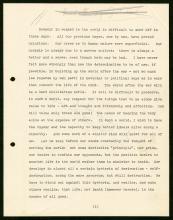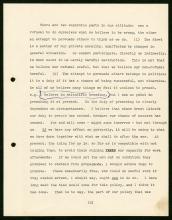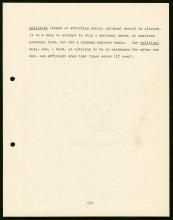BRACERS Record Detail for 131594
To access the original letter, email the Russell Archives.
The first line of this untitled typescript is "Despair in regard to the world is difficult to ward off in these days." Originally a MS of 2 leaves, it was enclosed with BR's letter to Lady Ottoline of 16 June 1918. He wrote: "Please send the next two sheets to C.A. (Hawse End Keswick) after reading them." Gladys Rinder wrote BR about it in a letter of very late June or early July: "CA sent me that note and asked me to have part of copied. You have put into words what many of us have been groping for.... I do so thoroughly agree with what you say about 'serving the world' through 'the positive desire to nourish life in the world rather than minister to death.'" The quotations are from the writing. Siegfried Sassoon, who was shown the writing, regarded it as a letter to Lady Ottoline. He remarked that death was a stimulus to life. "All this has been said before, of course. Bertrand Russell said it, very finely, in a letter (to Ottoline Morrell) written in 1918, when he was in prison: "'I wish to have the vigour and capacity to keep better ideals alive among a minority.... We have to stand out against this hysteria and realise, and make others realise, that life, not death (however heroic) is the source of all good.' I ask no better credo than that." (Diaries 1920–1922, ed. Rupert Hart-Davis [London: Faber and Faber, 1981], p. 1922).
Letter 18
BR TO CLIFFORD ALLEN / “DESPAIR IN REGARD TO THE WORLD”, [16 JUNE 1918]
BRACERS 131594. TL(TC). McMaster. Papers 14: 98
Previous Brixton letter, BRACERS 19314; next letter, BRACERS 18678
Edited by K. Blackwell, A. Bone, N. Griffin and S. Turcon
<Brixton Prison>
<18 June 1918>
Despair in regard to the world1 is difficult to ward off in these days. All our previous hopes, one by one, have proved delusions. Our views as to human nature were superficial. But despair is always due to a narrow outlook: there is always a better and a worse, even though both may be bad. I have never felt more strongly than now the determination to be of use, if possible, in building up the world after the war — not so much (as regards my own part) in material or political ways as in ways that concern the life of the mind. The world after the war will be a hard utilitarian world. It will be difficult to preserve, in such a world, any respect for the things that to me alone give value to life — art and thought and friendship and affection. Men will value only bread and guns: the means of keeping the body alive at the expense of others. In such a world, I wish to have the vigour and the capacity to keep better ideals alive among a minority. And some work of a similar kind will exist for all of us. Let us keep before our minds constantly the thought of serving the world: not some derivative “principle”, nor pride, nor desire to confute our opponents, but the positive desire to nourish life in the world rather than to minister to death. War develops in almost all a certain hysteria of destruction — self-destruction, among the more generous, but still destruction. We have to stand out against this hysteria, and realize, and make others realize, that Life, not Death (however heroic), is the source of all good.
There are two separable parts in our attitude: one a refusal to do ourselves what we believe to be wrong, the other an attempt to persuade others to think as we do. (1) The first is a matter of our private morality, unaffected by changes in <the> general situation. We cannot participate, directly or indirectly, in what seems to us merely harmful destruction. This is not that we believe our refusal useful, but that we believe our non-refusal harmful. (2) The attempt to persuade others belongs to politics: it is a duty if it has a chance of being successful, not otherwise. We all of us believe many things we feel it useless to preach, e.g. I believe in scientific breeding,2 but I see no point in preaching it at present. So the duty of preaching is clearly dependent on circumstances. I believe that since Brest Litovsk our duty to preach has ceased, because our chance of success has ceased.3 The end will come — might come tomorrow — but not through us. If we have any effect on posterity, it will be owing to what we have done together with what we shall do after the war. At present, the thing for us is, so far as is compatible with not helping them, to avoid their ruining our capacity for work afterwards. If we could get the men out on condition they promised to abstain from propaganda, I should advise them to promise. Those momentarily free, who could do useful work if they evaded arrest, I should say, ought now to do so. I have long said the time would come for this policy, and I think it has come. That is to say, the part of our policy that was political (aimed at affecting public opinion) should be altered. It is a duty to attempt to stop a runaway horse, at whatever personal risk, but not a runaway express train. Our political duty, now, I hold, is entirely to be in readiness for after the war, and efficient when that times comes (if ever).
- 1
[document] The letter was edited from an untitled typed copy in the Malleson papers in the Russell Archives. There is another copy elsewhere in the Russell Archives and one in the Morrell papers at Texas. The letter was originally enclosed as a manuscript of two sheets with BR’s letter to Ottoline of 16 June 1918: “Please send the next two sheets to C.A. (Hawse End Keswick) after reading them.” Ottoline wrote in her next letter in a way that reveals that she had read the letter: “I feel very strongly about surviving the War and keeping together a few souls who have The Light. They will be Needed dreadfully. — It will be a bitter world afterwards. — That is one of the New painful things one has to face. This cruel feeling — bitterness — and as you and I did Not cause it — It seems hard!!” (BRACERS 114747). Gladys Rinder wrote BR about the document in a letter of very late June or early July: “CA sent me that note and asked me to have part of it copied. You have put into words what many of us have been groping for.... I do so thoroughly agree with what you say about ‘serving the world’ through ‘the positive desire to nourish life in the world rather than minister to death.’” (This suggests that there was more to the original letter than the statement-like extract printed here.) The quotations are from the document. Siegfried Sassoon, who was shown a version of it in hospital in early August 1918 (Ottoline to BR, BRACERS 114753), regarded it as a letter to Lady Ottoline and copied it into his diary. He remarked first that death was a stimulus to life. “Bertrand Russell said it, very finely, in a letter (to Ottoline Morrell) written in 1918, when he was in prison: ‘I wish to have the vigour and capacity to keep better ideals alive among a minority<....> We have to stand out against this hysteria and realise, and make others realise, that life, not death (however heroic) is the source of all good.’ I ask no better credo than that” (Sassoon, Diaries 1920–1922, ed. Rupert Hart-Davis [London: Faber and Faber, 1981], p. 191). The letter was published as 98 in Papers 14.
- 2
scientific breeding Like many of his progressive contemporaries, BR was influenced by the early-twentieth-century vogue for eugenics. His advocacy of birth control can be understood in this light, but so can his approval of compulsory sterilization for the “feeble-minded” (see Marriage and Morals [London: Allen & Unwin, 1929], p. 166). At root, BR was driven by a concern that the poorest and least intelligent sections of the population were reproducing the most rapidly. While he shared questionable eugenic assumptions about heritability, he regarded the supposed dysgenic effects of this “differential birth-rate” as more socially than biologically determined. He could therefore graft his understanding of eugenics onto an ideology of social reform, whereas many eugenists took a Social Darwinist and laissez-faire view of the state (see Stephen Heathorn, “Explaining Russell’s Eugenic Discourse in the 1920s”, Russell 25 [2005]: 107–39). Although BR later sensed the totalitarian implications of “scientific breeding” — especially after the entire eugenics movement was discredited by Nazi racial theories and policies — he never completely disavowed this contentious strain of social thought (see Auto. 3: 173).
- 3
since Brest Litovsk our duty … chance of success has ceased This separate peace between the Bolsheviks and the Central Powers (signed on 3 March 1918) formally ended Russian participation in the war and allowed Germany to concentrate its military resources on the Western Front. While Allied leaders were alarmed by the strategic implications of the treaty, British peace campaigners were disheartened by the grasping territorial gains made by the Central Powers at the expense of the former Tsarist Empire. Many, including BR, had argued hitherto that Germany would be amenable to a general peace without annexations or indemnities if only the Allies signalled their willingness to compromise. See also Letter 9.



